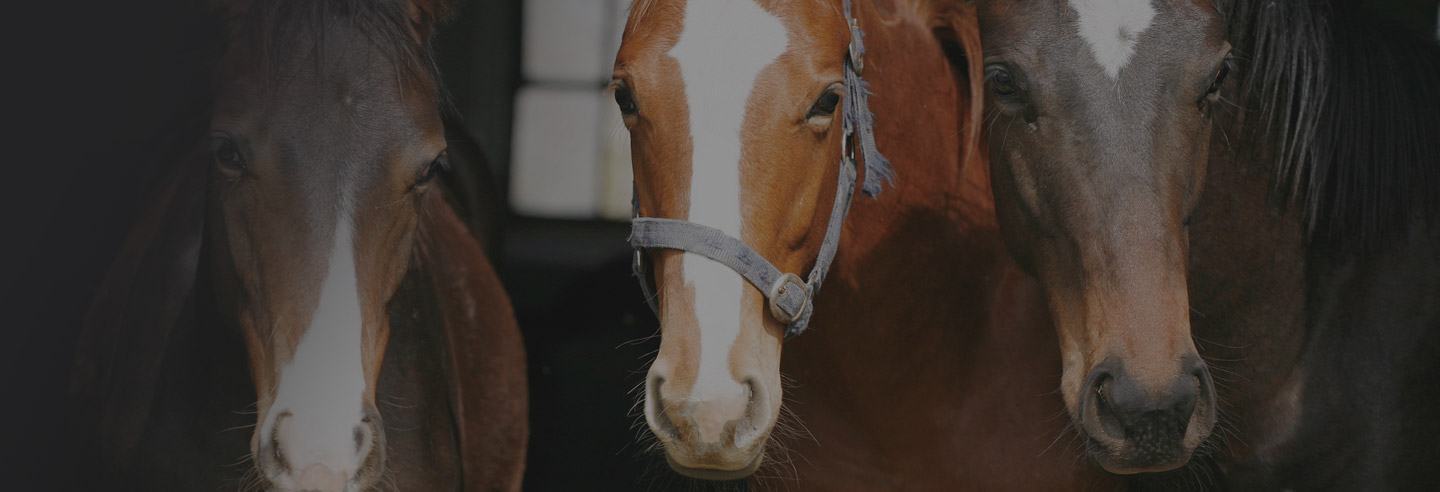
Vaccination Protocols
| Low Exposure Adult* | High Exposure Adult** | |
|---|---|---|
| Spring | EWT+WNV +/- Flu/Rhino | EWT+WNV Flu/Rhino Strangles |
| Fall | Flu/Rhino Strangles |
* Low Exposure Adult: A horse that does not leave the property and is not exposed to other horses that travel.
** High Exposure Adult: A horse that leaves the property or is exposed to other horses that travel.
| Foal* | Vaccine |
|---|---|
| 4 Months | EWT+WNV |
| 5 Months | EWT+WNV |
| 6 Months | Flu/Rhino |
| 7 Months | Flu/Rhino |
| 10-12 Months | EWT+WNV FLU/Rhino |
* Assuming mare was appropriately vaccinated.
Please call for protocol recommendations for foals from mares that were not vaccinated one month before foaling.
| Mares in Foal | Vaccine |
|---|---|
| 5 Months Gestation | Killed Rhino |
| 7 Months Gestation | Killed Rhino |
| 9 Months Gestation | Killed Rhino |
| One Month pre-foaling | EWT+WNV Flu/Rhino |
Parasite Control
Strategies for parasite control (such as rotating drugs) are no longer based on concepts from more than 40 years ago. We now know that frequent treatments are not necessarily needed to keep an adult horse healthy. Instead, guidelines recommend that a more sustainable strategy should be used to prevent drug resistance in the future and optimize herd health.
The ideal de-worming protocol involves Fecal Egg Counts (FECs) in the first year to identify shedding rates of individual horses. FECs are repeated after de-worming to determine product efficacy/identify emerging drug resistacnce.
| Low Shedder Adult Horse | Moderate Shedder Adult Horse | High Shedder Adult Horse | |
|---|---|---|---|
| First Frost | Ivermectin + Praziquantal or Moxidecin + Praziquantal | Ivermectin + Praziquantal or Moxidecin + Praziquantal | Ivermectin + Praziquantal or Moxidecin + Praziquantal |
| June | FEC | De-worm * | De-worm * |
| August | - | - | De-worm * |
* Drug is chosen based on FECs that were done in year one to identify drug efficacy. Contact our veterinarians to develop your program.
Foals
| De-worm: |
|---|
| 2 Months |
| 4 Months |
| 6 Months *FEC 2 weeks later* |
| 8 Months |
| 10 Months |
| 12 Months *FEC 2 weeks later* |
Please consult our veterinarians for drug choices. Foals can have adverse reactions or fail to respond to some anthelmintic drugs. Do not use moxidectin in foals less than 4 months of age or if they have not previously been de-wormed.
Yearling - 3 Years
| De-worm: |
|---|
| November |
| March |
| June *FEC 2 weeks later* |
| September |
| November *FEC 2 weeks later* |
Young horses should be de-wormed 4 times a year until they reach maturity/develop immunity. Choosing the class of drug to use is based on the post treatment FEC. Consult our veterinarians to confirm which drug to use.
Broodmares
| De-worm: |
|---|
| One month prior to due date |
| 36-48 hours post foaling |
Continue on a regular adult horse de- worming schedule based on FEC prior to pregnancy. Do not de-worm during the first trimester without first consulting one of our veterinarians.
Egg Reappearance Period (ERP) varies based on temperature, housing, manure removal and drug used. A good parasite program takes all these factors into consideration.








